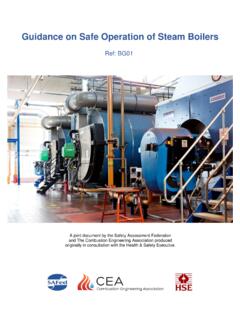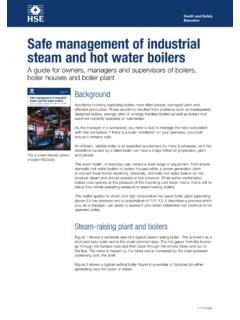Transcription of Guidance on Safe Operation of Hot Water Boilers
1 Guidance on safe Operation of Hot Water Boilers Ref: BG02 A joint document by The Combustion Engineering Association and the Safety Assessment Federation Guidance on the safe Operation of Hot Water Boilers (Ref: BG02) A joint document by The Combustion Engineering Association and the Safety Assessment Federation Edition 1 May 2019 All rights reserved Guidance on the safe Operation of Hot Water Boilers Edition 1 2019 page 2 Guidance on the safe Operation of Hot Water Boilers (Ref: BG02) Foreword This document, Guidance on the safe Operation of Hot Water Boilers (BG02) has been developed and written by the Combustion Engineering Association (CEA) in consultation with the Safety Assessment Federation (SAFed) and other stakeholders within the boiler systems and Water treatment industries to help designers, owners, managers and operators of new and existing boiler systems make health and safety and environmental improvements in the industry.
2 This first edition of BG02 incorporates up-to-date information and best practices relating to the Operation of hot Water boiler plant; steam Boilers are covered in a separate document (BG01). The first edition of BG01 included hot Water Boilers , but in response to feedback from users of the document, this separate guide for hot Water Boilers was created. This publication should not be regarded as an authoritative interpretation of the law, nor a mandatory legal requirement. However, if the Guidance provided is followed, it will normally be regarded as sufficient to comply with the relevant health and safety duties. Cover image courtesy of Bosch Thermotechnology Ltd Acknowledgements The Combustion Engineering Association (CEA) is an educational charity, which promotes the science of combustion engineering in the commercial/ industrial sector. The CEA is concerned with industry good practice and the safe and efficient Operation of combustion related plant and equipment.
3 Safety Assessment Federation (SAFed) is a trade association, which represents the independent engineering inspection and certification industry in the UK. SAFed s primary aim is to promote safety and reduce accidents in the workplace. SAFed supports corporate social responsibility through compliance with the law and adopting best industry practice. A special note of thanks to members of the CEA and those who have given their time freely to contribute to this guide: Matthew Walton - Bosch Thermotechnology Ltd Paul Whitehead - Energy and Environmental Solutions Adrian Rhodes - CEA Chairman Michael Casey FRSC - Deep Water Blue Ltd David Kilpatrick - CEA Director Kerrie Bourner - CEA Administrator 2019 The Combustion Engineering Association and the Safety Assessment Federation. In this document the following words convey specific meaning: Should: Compliance with this clause is not essential where supported by risk assessment and/or design calculation.
4 Shall: Compliance with this clause is required in order to claim compliance with this document. Must: Compliance with this clause is a legal requirement within the United Kingdom. Unless otherwise stated, all pressures refer to gauge pressure. Guidance on the safe Operation of Hot Water Boilers Edition 1 2019 page 3 This page is intentionally blank Guidance on the safe Operation of Hot Water Boilers Edition 1 2019 page 4 TABLE OF CONTENTS: PAGE 1 INTRODUCTION 5 2 SCOPE 6 3 LEGISLATION 7 4 LEGAL RESPONSIBILITIES 14 5 PERSONNEL AND RESPONSIBILITIES 17 6 TRAINING 22 7 DESIGN AND INSTALLATION 24 8 boiler Operation 33 9 MAINTENANCE, REPAIR AND MODIFICATION 38 10 PERIODIC EXAMINATION OF HTHW Boilers ONLY 40 11 ENERGY AND ENVIRONMENT 41 APPENDIX 1 - REFERENCES 42 APPENDIX 2 - DEFINITIONS 45 APPENDIX 3 DIAGRAMS OF TYPICAL boiler ARRANGEMENTS 47 APPENDIX 4 TYPICAL LOG SHEET EXAMPLES 57 Guidance on the safe Operation of Hot Water Boilers Edition 1 2019 page 5 1 INTRODUCTION Guidance on the safe Operation of Hot Water Boilers (Ref.)
5 BG02) is a Guidance document intended to assist the designers, owners, managers, operators, maintenance personnel and Competent Persons (CP) of new and existing low temperature and high temperature industrial shell hot Water boiler systems in addressing the following issues: The safe and efficient use and Operation of the boiler installation; Determining adequate supervision and maintenance requirements (levels and competence) that are consistent with the installed plant and its location; Reducing the likelihood of explosion or other dangers from events such as: o Loss of Water ; o Over-pressure; o Overheating due to excessive scale; Using efficient boiler Operation to avoid the excessive pressure/thermal cycles and load swings which can accelerate boiler fatigue or failure; Ensuring the provision of the correct Water treatment and monitoring of the system and boiler Water to minimise corrosion, scale and avoid microbiological fouling (biofouling), as these problems can result in energy wastage, poor system performance, and the need for early replacement of plant and components.
6 Compliance with the various legal requirements, in particular that for periodic examination by a CP in accordance with a Written Scheme of Examination (WSE) for high temperature hot Water Boilers . Typical hot Water boiler installation Image courtesy of Cochran Ltd Guidance on the safe Operation of Hot Water Boilers Edition 1 2019 page 6 2 SCOPE This document applies to all industrial hot Water Boilers (normally shell Boilers ), including mobile hot Water Boilers and waste heat Boilers , that fall into the following categories: Low Temperature Hot Water Boilers (LTHW): Boilers where the shut-off temperature of the safety temperature limiter does not exceed 110 C, with a design pressure up to 16 bar gauge; and High Temperature Hot Water Boilers (HTHW): Boilers where the shut-off temperature of the safety temperature limiter exceeds 110 C, with a design pressure up to 32 bar gauge. Relevant Standards There is a tradition of referring to Boilers operating in the range 100 C 120 C as Medium Temperature Hot Water Boilers (MTHW).
7 While carrying out research for this Guide, it was noted that legally speaking, hot Water Boilers are divided into only two categories, those where the limiter set point does not exceed 110 C, and those where it does. The authors are aware that design standards may appear to contradict this opinion; EN 14394 for example allows for the limiter to be set as high as 120 C, but note that all such standards include additional requirements for plant with a limiter set above 110 C and we are therefore content that separate advice for MTHW systems is not needed. A boiler working at 110 C can be designed to, for example, EN 14394, and have a safety cut out at say 120 C, and would therefore fall within the scope of PED/PSSR. The standard has the following text in the scope to cover this: This European Standard (EN 14394) specifies requirements for Boilers with normal operating temperatures between 100 C and 110 C and has a "dual structure": For Boilers where the shut off temperature of the safety temperature limiter does not exceed 110 C the Pressure Equipment Directive (PED) requires" Sound Engineering Practice", For Boilers where the shut off temperature of the safety temperature limiter exceeds 110 C this European Standard specifies the requirements of the PED as stated in Annex ZB.
8 EN 14394 includes ..for heating Boilers with a temperature TS > 110 C the requirements of EN 12953-8 shall be met. EN 12828 includes in the scope In case of heating systems with maximum operating temperatures over 105 C other safety aspects than those described in may apply. Exclusions The following Boilers are specifically excluded from the scope of this Guidance Document: Shell and tube steam Boilers Water tube Boilers ; Boilers with a capacity exceeding 37 MW nett rated thermal input; Domestic and commercial Boilers with a rated capacity less than 1000 kW; Electric immersion Boilers , electrode Boilers and steam coil heated Boilers ; Hot Water coil Boilers . However, just because these Boilers are outside of the scope of BG02, this does not mean that the regulations and general principles in this document should not be followed where suitable and applicable. Guidance on the safe Operation of Hot Water Boilers Edition 1 2019 page 7 3 LEGISLATION boiler systems are required to comply with different legislation, including a number of health and safety and environmental Acts and regulations, which are aimed at ensuring that new and existing boiler systems are continually operated and maintained in a safe manner.
9 The principal sets of health and safety legislation that support the Health and Safety at Work etc. Act 1974 and apply to the use of boiler systems covered by this Guidance are: The management of Health & Safety at Work Regulations 1999 (MHSWR); The Pressure Equipment (Safety) Regulations 2016 (PER); Gas Appliance Regulations 2016 (GAR); The Pressure Systems Safety Regulations 2000 (PSSR); The Provision and Use of Work Equipment Regulations 1998 (PUWER); The Gas Safety (Installation and Use) Regulations 1998 (GSIUR); and The Dangerous Substances and Explosive Atmospheres Regulations 2002 (DSEAR). With the exception of MHSWR, GAR and PER, all the regulations listed above are supported by Approved Codes of Practice (ACoP) and Guidance produced by the Health and Safety Executive (HSE), and available as free downloads from There are numerous sets of environmental legislation applicable to hot Water Boilers , including the Clean Air Act, the industrial Emissions Directive, and the Environmental Permitting Regulations (including the Medium Combustion Plant Directive).
10 Relevant legislation is addressed in later text. Refer to Appendix 1 for a list of currently applicable legislation. It is the reader s responsibility to ensure that they refer to the latest available version of any legislation or Guidance . The management of Health and Safety at Work Regulations 1999 (MHSWR) The management of Health and Safety at Work Approved Code of Practice (ACoP L21) has been withdrawn and is no longer available. If you are looking for information on how to manage risks in your business, HSE has a suite of Guidance that will be able to help. Each level of Guidance on HSE s website offers appropriately targeted information, focussed on making compliance as straightforward as possible. If you need basic information or are getting started in managing for health and safety, then the best place to look is Health and safety made simple: The basics for your business (INDG449). You should also consult: safe management of industrial steam and hot Water Boilers .

